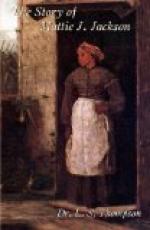days. A better condition of things now presented
itself. As he possessed a large share of confidence,
he came to the conclusion, as he was free, that he
was capable of selecting his own residence and manage
his own affairs with prudence and economy. But,
alas, his hopes were soon blighted. More heart
rending sorrow and degradation awaited him. He
was earnestly invited by a white decoyer to relinquish
his former design and accompany him to Missouri and
join him in speculation and become wealthy. As
partners, they embarked on board a schooner for St.
Charles, Mo. On the passage, my grandfather was
seized with a fever, and for a while was totally unconscious.
When he regained his reason he found himself, near
his journey’s end, divested of his free papers
and all others. On his arrival at St. Charles
he was seized by a huge, surly looking slaveholder
who claimed him as his property. The contract
had previously been concluded by his Judas-like friend,
who had received the bounty. Oh, what a sad disappointment.
After serving for thirty years to be thrust again into
bondage where a deeper degradation and sorrow and hopeless
toil were to be his portion for the remaining years
of his existence. In deep despair and overwhelmed
with grief, he made his escape to the woods, determined
to put an end to his sorrows by perishing with cold
and hunger. His master immediately pursued him,
and in twenty-four hours found him with hands and
feet frost-bitten, in consequence of which he lost
the use of his fingers and toes, and was thenceforth
of little use to his new master. He remained
with him, however, and married a woman in the same
station in life. They lived as happily as their
circumstances would permit. As Providence allotted,
they only had one son, which was my father, Westly
Jackson. He had a deep affection for his family,
which the slave ever cherishes for his dear ones.
He had no other link to fasten him to the human family
but his fervent love for those who were bound to him
by love and sympathy in their wrongs and sufferings.
My grandfather remained in the same family until his
death. My father, Westly Jackson, married, at
the age of twenty-two, a girl owned by James Harris,
named Ellen Turner. Nothing of importance occurred
until three years after their marriage, when her master,
Harris failed through the extravagance and mismanagement
of his wife, who was a great spendthrift and a dreaded
terror to the poor slaves and all others with whom
she associated in common circumstances, consequently
the entire stock was sold by the sheriff to a trader
residing in Virginia. On account of the good reputation
my mother sustained as a worthy servant and excellent
cook, a tyrannical and much dreaded slaveholder watched
for an opportunity to purchase her, but fortunately
arrived a few moments too late, and she was bid off
in too poor a condition of health to remain long a
subject of banter and speculation. Her husband
was allowed to carefully lift her down from the block




